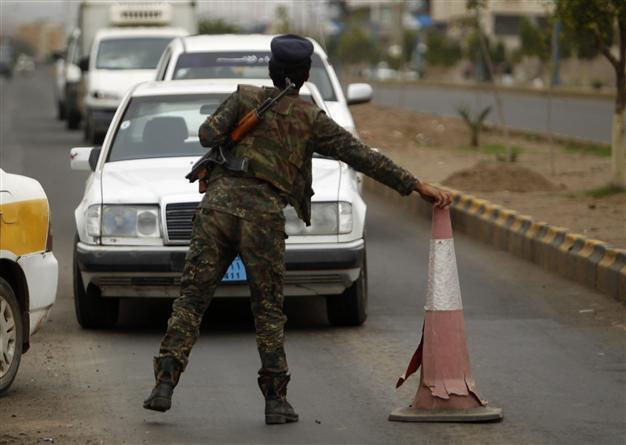US and Britain withdraw diplomats from Yemen amid global Qaeda alert
WASHINGTON - Agence France-Presse

A police trooper is seen manning a checkpoint in Sanaa August 5, 2013. REUTERS/Khaled Abdullah
The United States and Britain Aug.6 ordered diplomatic staff to urgently leave Yemen due to a terror alert. The U.S. State Department ordered all non-essential staff out of Yemen and told Americans to leave the country “immediately” over terrorism concerns.“The U.S. Department of State warns U.S. citizens of the high security threat level in Yemen due to terrorist activities and civil unrest,” it said in a statement.
The statement said the “threat level in Yemen is extremely high” because of the potential for both terrorist attacks and civil unrest.
It said it had “ordered the departure of non-emergency U.S. government personnel from Yemen due to the continued potential for terrorist attacks.”
“Terrorist organizations, including Al-Qaeda in the Arabian Peninsula (AQAP), continue to be active throughout Yemen,” it said. “The U.S. government remains highly concerned about possible attacks on U.S. citizens (whether visiting or residing in Yemen), and U.S. facilities, businesses, and perceived U.S. and Western interests.”
Britain also said it had withdrawn all staff from its embassy in Yemen, after the United States ordered its citizens to leave the country following a worldwide terror alert.
Al-Qaeda chief commands attack
“Due to increased security concerns, all staff in our Yemen embassy have been temporarily withdrawn, and the embassy will remain closed until staff are able to return,” a Foreign Office spokesman said.
It was widely reported on Aug. 5 that the closures follow an intercepted communication between al-Qaida leader Ayman al-Zawahiri and the chief of the terrorist organization’s Yemeni affiliate.
The New York Times said in its online edition that the electronic communications last week revealed that Zawahiri had ordered Nasser al-Wuhayshi, the head of Al-Qaeda in the Arabian Peninsula, to carry out an attack as early as Aug. 4.
CNN meanwhile reported that Zawahiri told Wuhayshi to “do something,” causing officials in both Washington and Yemen to fear an attack was imminent.
The alerts came hours after a drone strike killed four Al-Qaeda militants in Yemen and two days after the closure of some two dozen embassies in the Middle East and Africa.
It was not immediately clear if the strike was linked to the global alert. U.S. officials rarely speak about the drone program. Several U.S. allies, including France, Germany and Norway have also announced closures of some of their missions in the region.
Lawmakers in Washington described the threat level as very serious, with some invoking the September 11, 2001 attacks.
“I’ve spent 21 years in the CIA, and I don’t think I’ve ever seen 22 embassies closed simultaneously. This is very, very unusual,” Robert Baer, a former CIA officer in the Middle East, told CNN.
Late last week, the State Department issued a worldwide travel alert warning U.S. citizens of possible attacks on “public transportation systems and other tourist infrastructure.” On Aug. 2, the global police agency Interpol issued a security alert over hundreds of militants freed in jail breaks. Interpol said it suspected Al-Qaeda was involved in the mass breakouts in nine countries, notably Iraq, Libya and Pakistan.
















